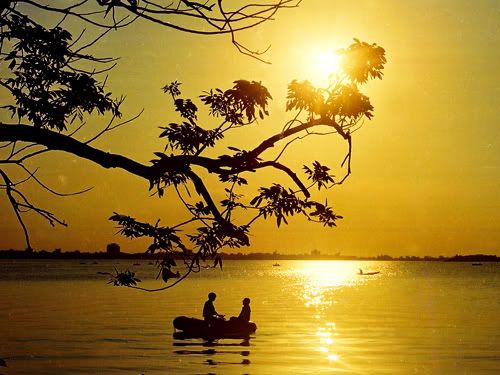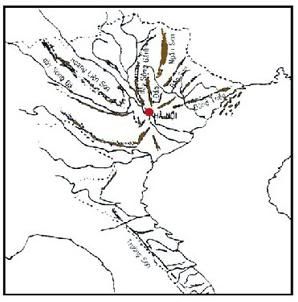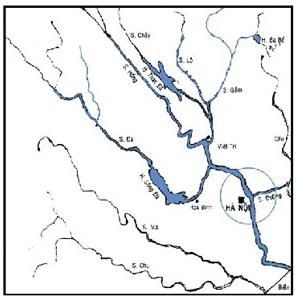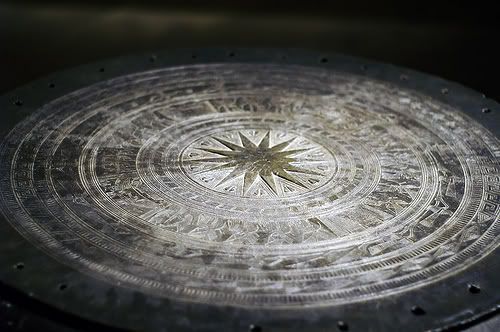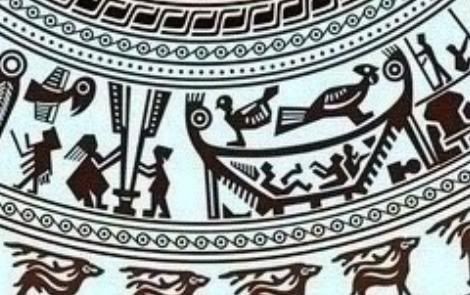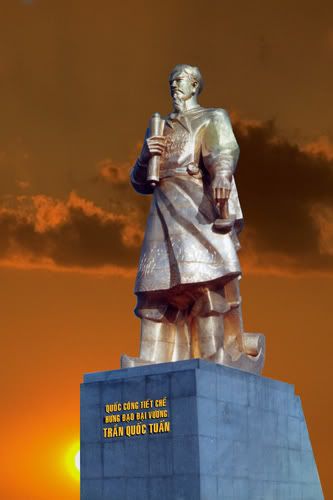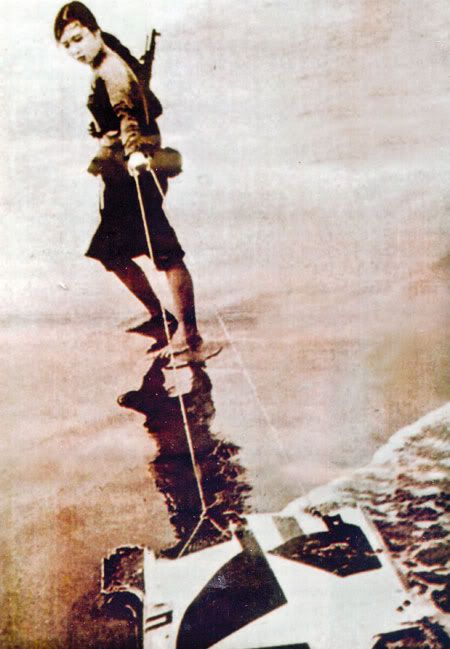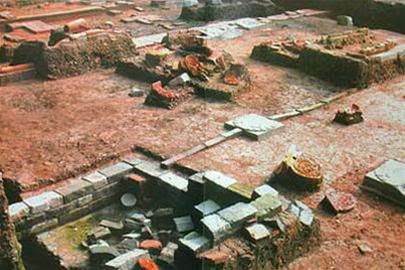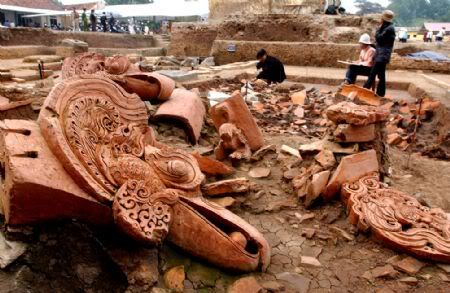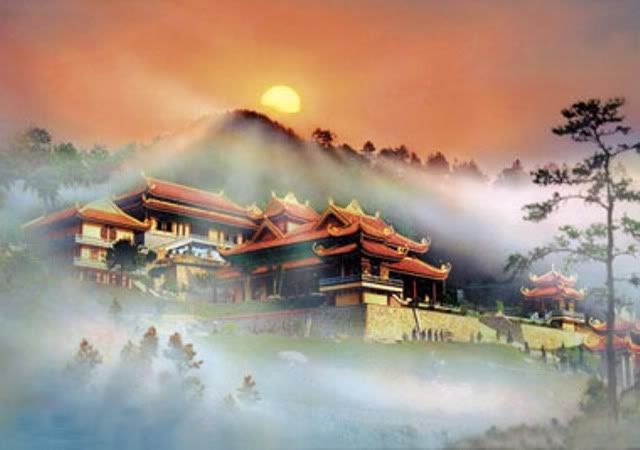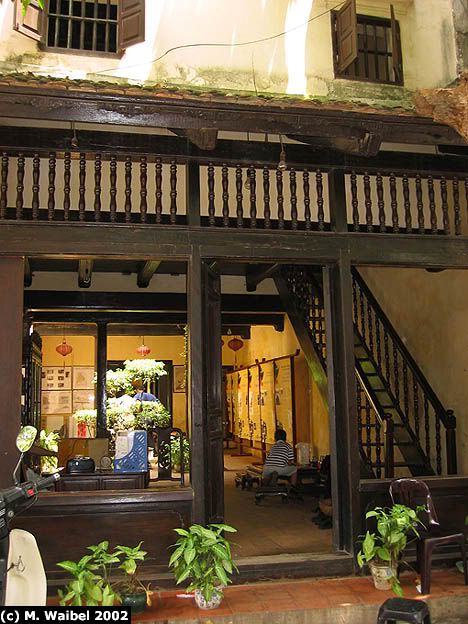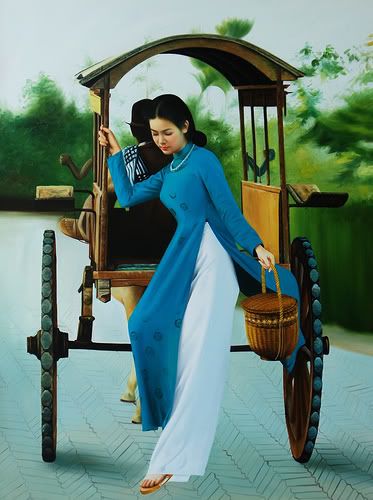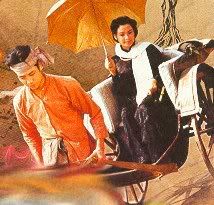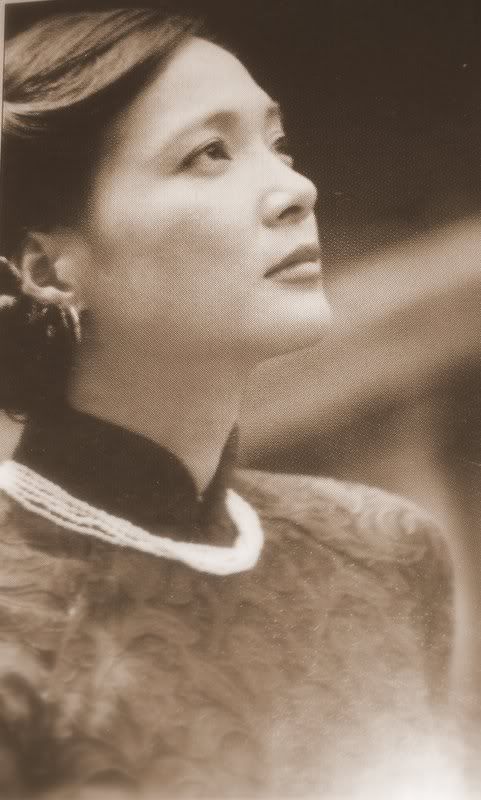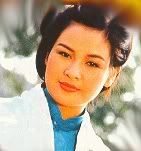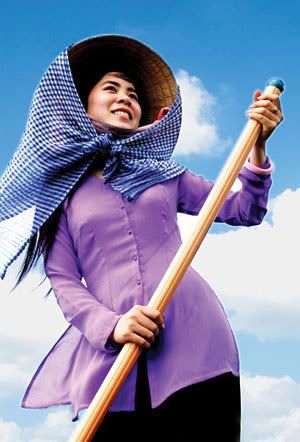VIETNAM – SUCH COUNTRY AND PEOPLE
(A personal review about my country)
With a modest land area located in southeast of the Asia continent, it can be said that with many people on this planet, Vietnam seems to be a strange name, without any significant impression. This is also normal when for recent decades, centuries, the world has entered the competitions on economy, politic, military, science and technology ... and the attentions in a global scale are for leading countries or territories in these fields. It is natural, the competition will lead to changes, which sometimes is called "developing", "growth" and vice versa in some cases called "recession", " crisis "," unstable ". In this context, for nearly two decades, Vietnam has emerged as a stable, peaceful, friendly country and gotten more attentions of international friends. This peaceful and friendly images get simply from present circumstances, from the existence reason or hidden factors? And more importantly, what is the meaning of this?
With an opened economics development policies, including tourism, more and more international tourists come to Vietnam. Many local and foreign experts, inside and outside the tourism industry have confirmed that Vietnam has great potentials with three important resources for tourism development: natural resource, historical resource and cultural resource. And here, I myself, with a limited knowledge, would give a review for people, who interested in whether traveling or researching, to have a clearer view about Viet Nam.
Favor of nature
Need to admit that, Vietnam is blessed with diverse terrain from sea, rivers, plains, plateaus, mountains and forests. Even with the beautiful landscapes of nature, some places are recognized as a world natural heritages such as Ha Long Bay, Nha Trang Bay, Phong Nha Ke Bang Cave, the Son Doong Cave, Sapa (Fanxipan peak - Roof of the Indochina) ... but with the infrastructure is poor, many tourism activities are unprofessional, service quality is low or not high, the environment is polluted, awareness of local people are low… the natural advantage is not a real strength of Viet Nam. Especially when comparing with many other countries, even moderately favorable conditions of nature, but good infrastructure, professional organization, reliable service quality and clean environment... like Singapore, Thailand, Japan, Korea, France, Spain, Canada ... the advantages of natural conditions are not a real advantage (except when tourists are not too difficult customers and sympathizing with Vietnam tourism). Only one thing is a real advantage that no other country in the world has is that Hanoi capital and surrounding areas have special terrain, the mountains gravitate toward the center and the rivers harmoniously gather at the metropolitan area. In 1010 the wise Ly Thai To King realized the terrain of ”flanking dragons and sitting tigers” or “rivers gather – mountains prostrate” where the rivers and mountains create an sacred place according to feng shui. He selected this land as the new capital by historical Imperial Decree about "Moving the Capital" that later lead to briliant Ly - Tran dynasties. In 2010 Vietnam solemnly celebrated the 1,000th anniversary of Dragon City. (The vestiges of Thang Long citadel, found under the ground, are displayed in Relic Ancient Hanoi City at 18 Hoang Dieu Str, Ha Noi city).
History full of woes and glories
Perhaps few people in the world, including Vietnamese, know that in the historical legend (recorded both in Vietnam and China) said: Former De Minh King is the nephew of third generations of Vien De King - Shennong (the King had special abilities, high intuition and knew the characteristics of plants and instructed people to grow plants and to treat health with medicinal plants) ruled a vast territory encompassing the entire China to the Quang Tri and Thua Thien Hue province of Vietnam today. De Minh King had the eldest son named De Nghi. Once, De Minh King went on patrol to the south to Ngu Linh mountain (Hunan, China), he met and then married the daughter of Vu Tien, a lord in the area. Then they gave birth to an intelligent and moral son, being named Loc Tuc. According to common sense, the king will transfer the throne to the eldest, De Nghi, but the younger brother was too virtuous, clever (learned the extraordinary abilities from parents) so De Minh King intended to transfer the throne to Loc Tuc. However, because of high virtue, the second son refused the throne and recommended his father to transfer the throne to De Nghi, the second son gave up his throne to his brother. De Minh King esteemed second son more and finally decided to divide the country into roughly equal halves, De Nghi was king of the north and Loc Tuc was king of the south, named Kinh Duong Vuong (currently in Bac Ninh, near Hanoi, there is Kinh Duong Vuong Temple). The territory of the ethnic Vietnamese at that time was vast from the north east Dong Dinh lake in Hunan Province, China today, to Quang Tri and Thua Thien Hue provinces of Vietnam today, nearly same area with territory of De Nghi King. Kinh Duong Vuong became King around year 2879 (B.C) and later got marriage with the daughter of Dragon deity (who had the extraordinary abilitity of the dragon, lived in the rivers area), being the lord of Dong Dinh lake area. They gave a birth to a son, named Sung Lam. Sung Lam was also taught by his parents about many magical powers before being transferred throne named Lac Long Quan (Dragon King). Later, during a trip to the South, Lac Long Quan met Au Co, a female lord in area near Bac Ninh, Ha Noi today, being as beautiful as a fairy, elegant and with extraordinary abilities (As mentioning about the special position of the Hanoi area, where the rivers gather and the mountains prostrate”, more than 4.000 years ago, this place could be a land of fairy scene, and the appearance of fairy lady with the extraordinary abilities is also a logical conclusion). With beauty, charm, gentle and upright of Au Co, Lac Long Quan - who is also a talent and wisdom king with extraordinary physiognomy and the blood of the dragon - was completely fallen in love with Au Co. Because Au Co was a lord with a strong personality, affected partly by the matriarchy, after marriage, she did not agree to go back to the capital of Lac Long Quan King. He decided to live in fairy land with Au Co and he neglected the throne making the majority of territory be occupied gradually by the brother’s military. With long life, up to several hundred years, two people gave birth to about 100 children. The blood of Dragon and Fairy from that time spreaded in many generations of Viet Nam to date. Living together for a long time, taking care of the children growing up, the couple could sometime arised contradictions (the fact that the father Lac Long Quan living in the north under patriarchy, mother Au Co living under matriarchy so sometime they had different views about something; and mother Au Co still liked living and traveling over high mountains, father Lac Long Quan, with dragon blood, prefered to live near rivers, lakes, and when getting old, they want to live with their tastes) and brothers having similar tastes with the mother, went to live in the mountainous area, the brothers having similar tastes with father, went to live in the plains. Around 50 brothers following Lac Long Quan went down the delta to build, develop economy and organize society. Population became more crowded and later formed the first clear State of Vietnam that had been formed and managed for 18 Hung Kings. Today, traces of the capital of the Hung King reigns still exist in Phu Tho province with the Hung temple monuments that every year millions of Vietnamese attending the Death anniversary of March 10 of lunar year. 18th Hung King had no son, the son-in-law, Son Tinh (Tan Vien mountain deity), also did not want to be transfered the throne and later recommended the Hung King to give jurisdiction of the country to An Duong Vuong (the last King from the lineage following the mother Au Co). An Duong Vuomg swore to preserve the country that there is a traces of a stone column left in the Hung King temples. During 18 Hung Kings, under the talent, virtue, martial arts, the extraordinary abilities of Hung Kings, the country lived in peace and prosperity period with a peak of the Dong Son culture of the Red River civilization. The remains of Dong Son culture are displayed in Ha Noi museum now.
Details on bronze drum
And at the end of An Duong Vuong‘s reign, the country was invaded by Trieu Da from the northern, and Vietnam fell into the ruled period by China for nearly 1,000 years beginning in 207 B.C. During this period, there was still some revolts of many national heroes that the intellectual, historical battle of Ngo Quyen on Bach Dang River – smashed the army of Han dynasty - ended nearly 1000 year ruled period of China. And then later period marked by glorious Ly - Tran dynasties from 1009-1400 with historical Imperial Decree about "Moving the Capital" in 1010 of Ly Thai To King. At Tran dynasty, horse soldiers of Mongolian invader invincible in China, Russia, Middle East and Eastern Europe were stopped three times in Vietnam and they were also stopped by Korean troops with support of Ly Long Tuong (Lee Sang Yong), a descendants of the Ly dynasty, who politically refugeed here.
The following centuries, Vietnam had fallen into arduous stages in some civil wars and fightings against China, France, Japanese fascists, Americans with holy wars against France, the U.S. recently.
Statue of General Tran Hung Dao
Small girl pulled the remains of US army aircraft
The relics and ruins of history
With the glorious history has stretched over 4.000 years but due to being often threaten by foreign invaders, many monuments associated with famous historical anecdotes were destroyed by the invading army, or could not maintain, protect. National treasury of small country could not afford for large projects. Today, only the evidence, associated with the holy wars against the French and American, still have the maintenance and preservation but many vestiges of ancient anecdotes disappeared and there are only the heroes’ temples and symbolic artifacts left. Also, as a viewpoint of lifestyle of Vietnamese is to enjoy life peacefully, after undergoing too many sorrows, losses in the wars, Vietnam people did not want to store too many the traces of suffering, but keep some remnants to remind following generations about the wars and its cruelty.
Vestiges of Dragon City (Imperial Citadel)
The ancient message – Calm from the history
What lengthens Viet Nam history up to over 4.000 years while there are few traces left? What makes Vietnam people love living peacefully, friendly, stably? Or why during nearly 1.000 years, China tried to assimilate Viet Nam culture by Chinese culture but Vietnamese still retained its features? Whether or not, the Kinh Duong Vuong had no power ambition, intended to gave up the throne to his elder brother; blood of dragon and fairy in Lac Long Quan - Au Co legend; the piety of Lang Lieu prince to 6th Hung King in “Chung Cake” story; about Son Tinh (deity of moutains)with glorious victory against Thuy Tinh (deity of sea) to marry princess and later refused the crown of last 18th Hung King and suggested to give it to An Duong Vuong; the uprising of Trung Trac and Trung Nhi, two Viet Nam heroines had to rise up prematurely (due to Trung Trac's husband, Thi Sach, who commanded the force preparation to not only defeat the Han army but also protect the country sustainably for long-term, had been poisoned) to defeat the army of general To Dinh of Han dynasty though three years later, Viet Nam was invaded again by Han dynasty, Hai Ba Trung jumped into the river to suicide; thoughts of Ly Thai To, a King was originally raised in a pagoda or after defeating Nguyen Mong troops, Tran Nhan Tong King gave up the throne and went to Yen Tu mountain to practise as a Buddhism monk and later became enlightened one and then went back with teachings for people, contributing partly to the prosperity of Ly – Tran dynasties; the bravery, wisdom, tenacious Quang Trung King never suffered a defeat for seven years before his death; the life and career of Ho Chi Minh president - a big heart always desired independence and freedom for the nation ... have not only stopped at the texts of historical stories, or the faint traces of history but also have become the messages, viewpoints and the spirit of the nation. In times of confrontation against the invaders, the Vietnam was always small, primative against big invaders with modern weapons. The message of not desiring for power, not running with personal enjoyment but sacrifice all life for the country of many heroes, itself, form the calm for the Vietnamese to have a calm, smart, selfless, indomitable and tenacious mind in unequal battles to protect the nation. These messages have been cultivated into lifestyle, the culture, the inner spirituality of every Vietnamese.
Viet Nam culture under affection of material civilization
More than 4.000 years living on the land where natural conditions are favorable for agriculture, Viet Nam people have gradually formed a lifestyle in harmony with nature. After undergoing many pains and sufferings of the wars, Viet Nam people have gradually formed a lifestyle with compassion, sincerity, and mutual help. When two heroines Trung Trac, Trung Nhi defeated Han troops; battle of Ngo Quyen on Bach Dang river defeated Han troops; General Tran Hung Dao commanded Dai Viet army to defeat Mongolia invader three times; President Ho Chi Minh lead the nation to defeat the French army and started the stop of colonialism worldwide, Viet Nam people have gradually formed a lifestyle with courage, aspirations and country love. And when Buddhism was introduced into Vietnam from B.C; Ly Thai To King was raised and taught in a pagoda, accepted Confucianism and brought Confucius statue into the Temple of Literature; Tran Nhan Tong King, after completing his obligations with the country, ceded the throne to his prince and went to Yen Tu mountain to practise as a Buddism monk and later became an enlightened one and went back with teachings for people… Viet Nam people have gradually formed a lifestyle with spirituality that was a combination of Tam Giao Dong Nguyen or triple religions including Buddhism, Confucianism and Taoism.
All were gradually formed the nation's cultural identity that lifestyle associated with the harmony with nature, compassion, sincerity, mutual help, courage, aspirations and country love... A spiritual life associated with peace and tranquillity. An ideology life associated with combination of triple religions including Buddhism, Confucianism and Taoism. And a cultural identity associated with folk festivals (Hung Temple festival, Giong festival, Lunar New Year, Tran Temple Festival, Perfume Pagoda festival, Yen Tu Pagoda festival ...), poetry (ca tru, Hue royal court music, folk songs of Bac Ninh), calligraphy (Chinese and Vietnamese), photography photos, art (Dong Ho paintings), handicrafts(bamboo rattan, pottery, sculpture, silk weaving, embroidery ...), clothing (long dress, ao ba ba), foods (Hanoi cuisine, Hue cuisine, Hoi An cuisine, Ho Chi Minh city cuisine) etc.
Old house at 87 Ma May Str, Ha Noi
The beauty of old Hanoian
Vietnam culture is being eclipsed and affected by the material civilization
Thanks to the achievements of science and technology - especially from the western - the material civilization grows more and more with it changes in the spiritual life. In front of the flashy and modern facilities, the oriental countries seem to be overwhelmed and fascinated. As a developing country, the Vietnam people are also in that trend. Everyone must work and spend more time on seeking the modern facilities and technologies that are changing constantly. These changes push everyone into a vibrant, noisy and stressful life. Meanwhile – With excessive consuming life, many cultural and spiritual values are overlooked - many development countries have arised the unrest in the lifestyle in society, the alarming diseases etc. And in the context of economic, cultural, technical integration is happening everywhere, cultural values of thousands of lives, the sacred spiritual values of the Vietnam people are overshadowed and shaky by materialized trend, negative affection of global integration.
To find the messages of the ancestors about a harmonious and sustainable lifestyle
Vietnam history and culture showed that many talents and virtuous ancestors dedicated their intellectual, sacrificed themselves for people in the war, were not in chase of power ambition or personal enjoyment, formed the lifestyle with sincerity, mutual help in the peace, lived harmoniously with nature or with the beauty created by craft men such as clothing, foods, art and craft occupations ... Whether or not, it is the sustainable philosophy from our more than 4,000 year history which has created a peaceful, friendly and stable Viet nam today?
The development of material civilization is an inevitable trend. Civilization, refinement and liberality of many westerners, having intellectual and moral, making many easterners respect is the truth. Spiritual values, the messages are in the culture and history of the nation for thousands of lives have been demonstrated and documented. In front of the reality that history is being forgotten, culture is being overshadowed by lifestyle, following the material enjoyment and realistics, that many people in Vietnam are learning from Western, I still have a deep believe in mind that the citizens with bood of dragon and fairy will be awaken soon to find out a sustainable and stable lifestyle in a world rising uncertainties, sufferings, crisis, poverty, diseases, natural disasters, environmental pollution ... With these limited study and knowledge about history and culture, I also want to give a assumption about the message from the ancestors, that is: "Living just enough material, be friendly to nature, be physically healthy, and with inner spiritual power basing on a deep understanding of lofty culture values and a wisdom calm inner”.
You can simply visit Viet Nam and leave. You can find something is good, something is not good, something is bad or something is not so bad. Above personal review is made after many years I tried to learn about my homeland. And I hope It will be useful for someone who is researching about this small country, Viet Nam.
Tran Nghia,
Ha Noi, November, 2011
